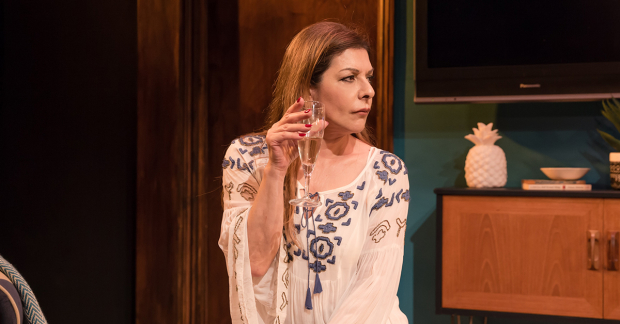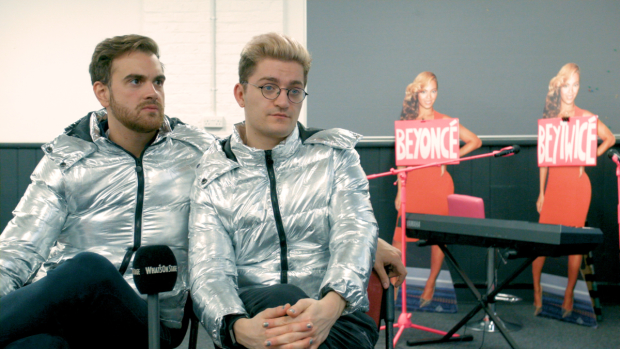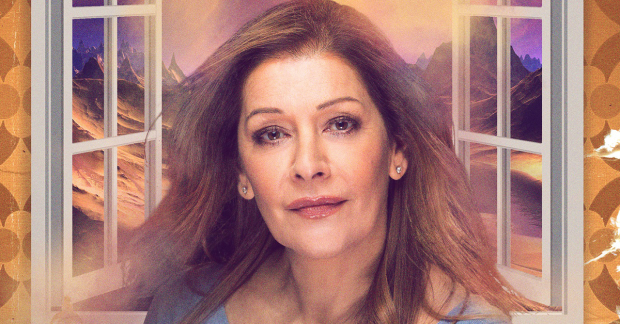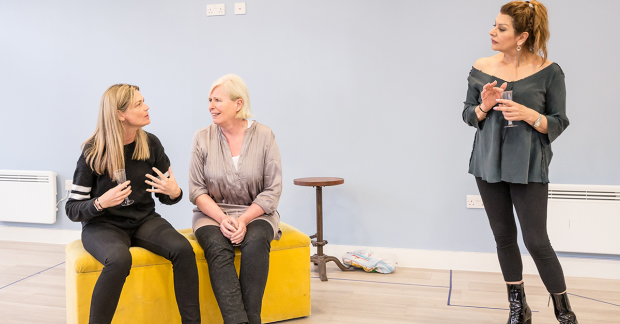Review: Dark Sublime (Trafalgar Studios)

© Scott Rylander
"Were all stars to disappear or die,/I should learn to look at an empty sky/And feel its total dark sublime,/Though this might take me a little time."
The above is taken from "The More Loving One", a poem by WH Auden, which helped inspire the title of Michael Dennis' play. The poem is both referenced within the show, as well as read aloud, and Dark Sublime is the name given to a sci-fi programme which made Marianne (Marina Sirtis) a television star in her youth. In this context, the poem becomes a commentary on the nature of fandoms and for understanding and accepting unrequited love, two themes that bubble underneath the current of this play.
Sirtis is known for her role as Conselor Deanna Troi in Star Trek: The Next Generation and here plays Marianne, a once-famous, now jaded actress who gets by with the odd radio gig and corporate training workshop. It's clear that neither is fulfilling or exciting for her, and she instead finds worth and connection through her relationship with best friend Kate (Jacqueline King). So how can Marianne say no when Oli, a young superfan, turns up at her doorstep, asking to interview her, offering her the chance to remember a time when she was – in the world's eyes, anyway – at her peak?
It would be difficult to review the show with justice without talking about an important spoiler here: we learn that Marianne is secretly in love with her best friend Kate. When Kate begins dating Suzanne (Sophie Ward), Marianne does not know how to process her emotions, and responds explosively instead. The show explores what love is like for older gay women – particularly noting that with age comes the expectation of a certain maturity. In one scene Marianne muses about the younger generation, who are able to state their feelings, love and move on. Her new friend Oli only half-listens, as he is busy communicating in his own way – typing away on his phone. His character is the embodiment of the younger generation in the piece and though this is a heavy responsibility Kwaku Mills plays the role of the young gay man with joy and authenticity. Ward also shines as Suzanne, in touching intimate scenes between herself and her new lover.
The show then flips between live scenes following Marianne's story, and re-enactments of the fictional television show, Dark Sublime. The re-enactments are tongue-in-cheek, with Simon Thorp playing the hero. The whole set springs to life during these moments, with the cosy living room transforming into a spacecraft (designs from Tim McQuillen Wright). The innocent-looking coffee table becomes a lit-up control panel, springing to life with constant beeps, whizzes and whirring sound bytes immersing us within the sci-fi world. The door panels even become a multi-coloured robot, humorously voiced by Mark Gatiss. The narrative of the fictional television show also parallels the complex emotions felt between Marianne and Kate, by exploring what it means to search for something that can never fulfil you – whether it's a treasure hunt through parallel dimensions, or hunting for a sense of purpose in real-time and real-space.
Dennis does well to interweave all the narratives across multiple locations (and dimensions). The humour is not lacking and Andrew Keates rightfully leans into this with his direction – there are many jokes about the performance industry that work well in this meta-production – but the comedy is formulaic and does become predictable quite quickly.
Ultimately, Dark Sublime manages to be a both light-hearted and serious foray into the world of fandoms which gleefully unpacks the experience of attraction and rejection. It is also a reminder of the well-known saying that meeting your idols isn't always all it's cracked up to be.
















